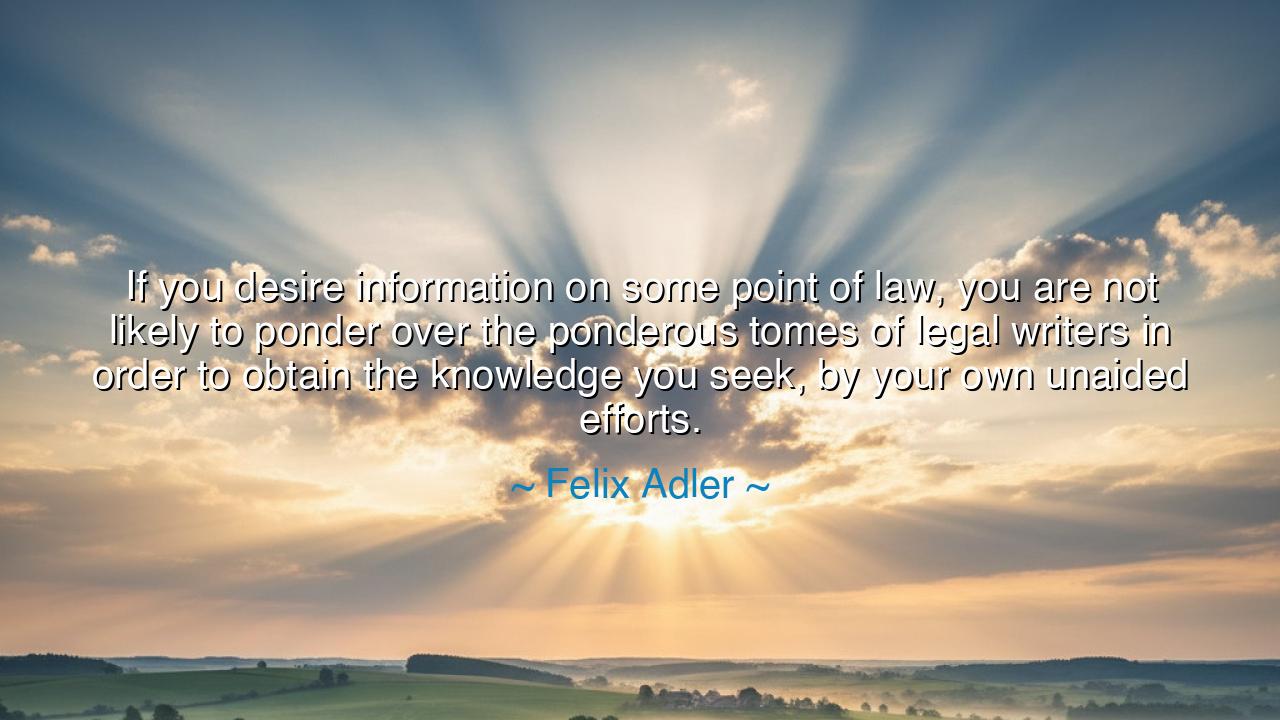
If you desire information on some point of law, you are not
If you desire information on some point of law, you are not likely to ponder over the ponderous tomes of legal writers in order to obtain the knowledge you seek, by your own unaided efforts.






When Felix Adler wrote, “If you desire information on some point of law, you are not likely to ponder over the ponderous tomes of legal writers in order to obtain the knowledge you seek, by your own unaided efforts,” he was not merely speaking of legal study — he was revealing a truth about human nature and the pursuit of knowledge. His words remind us that wisdom is not born from isolation, nor is understanding the fruit of stubborn pride. Rather, true learning begins when we recognize the limits of our own strength and open ourselves to guidance, community, and humility. In this, Adler speaks as the ancient teachers once did — urging us to seek enlightenment not through solitary struggle, but through the living exchange of minds.
The origin of this quote comes from the reflections of Felix Adler, the moral philosopher and founder of the Ethical Culture movement in the late 19th century. A man of intellect and compassion, Adler sought to unite reason with ethics, and knowledge with purpose. He lived in an age when education was becoming more specialized, and the professions — law, medicine, theology — had erected walls of complexity around their wisdom. In his statement, he observes the futility of trying to navigate such intricate systems alone. To learn the law, or indeed any profound discipline, one must seek the counsel of those who have walked its path. For the law, in his metaphor, is not simply written in books — it is alive in the minds and judgments of the wise.
In the ancient world, this truth was well understood. The philosophers of Greece and the sages of the East all knew that knowledge was best transmitted from master to pupil, from mind to mind, as a living flame. Socrates did not hand his students scrolls to read — he questioned them until their own reason caught fire. Confucius taught that wisdom cannot be grasped through study alone; it requires learning from the virtuous and reflecting upon their conduct. So too, Adler suggests that to understand the spirit of law — its justice, its logic, its humanity — one must engage with those who breathe life into it, rather than lose oneself in the “ponderous tomes” of abstraction. For books preserve knowledge, but teachers awaken it.
Adler’s observation also speaks to the humility required for true learning. Pride whispers that we can discover all truth alone, that by reading enough or thinking deeply enough, we can unlock any mystery. But wisdom whispers otherwise. The greatest minds of every age — from Aristotle to Newton, from Gandhi to Einstein — stood upon the shoulders of others. They listened, they questioned, they sought correction. In this sense, Adler’s quote is not merely practical advice for legal scholars; it is a parable about the human condition. Knowledge without humility leads to confusion, while humility opens the door to understanding.
Consider the story of King Solomon, who, though he ruled with unmatched power, began his reign not by boasting of wisdom, but by praying for it. He did not ask for wealth or victory, but for the ability to discern right from wrong — for guidance from beyond himself. And so he became wise. Likewise, the student who seeks to master law or life must first learn to listen, to ask, to receive. Adler’s words remind us that we gain clarity not through isolation, but through the exchange of intellect and the humility to be taught.
Yet there is another layer to his meaning — a moral one. The law, to Adler, was not merely a profession but a reflection of society’s conscience. To understand it deeply, one must approach it with reverence, guided by those who see beyond technicalities to the ethical heart of justice. To read the law without the guidance of the wise is like reading sacred scripture without a teacher — one may know the words but miss the spirit. Thus, his advice is not simply about efficiency, but about depth. He invites us to seek understanding not only of rules, but of righteousness, for the law that serves no moral end is but ink upon parchment.
And so the lesson is clear: do not walk alone in the pursuit of truth. Whether you seek knowledge of the law, of art, of life, or of the human soul, do not lock yourself away with your books and pride. Seek the company of the wise, the counsel of mentors, the dialogue that sharpens thought. For wisdom is not a solitary achievement; it is a sacred inheritance passed from heart to heart. As Felix Adler reminds us, the law — and indeed, all wisdom — is not found in dusty tomes but in the living exchange between seekers and teachers. To learn deeply is to learn together, and to do so with humility is the beginning of true enlightenment.






AAdministratorAdministrator
Welcome, honored guests. Please leave a comment, we will respond soon